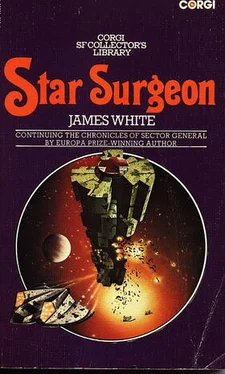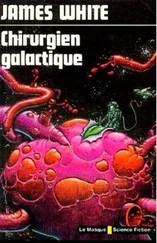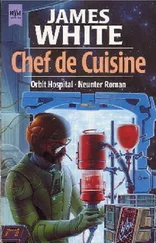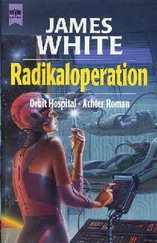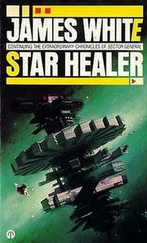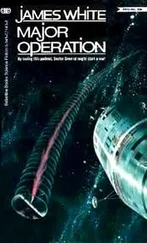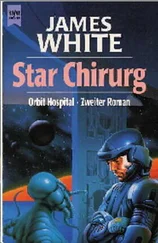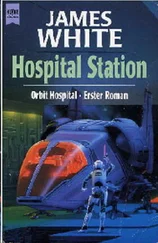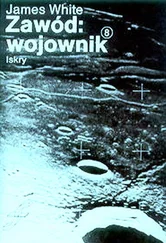“You’ve lost the ability to think about anything but your patients, Doctor!” Dermod snapped back. “It might surprise you to know that I think about them, too, but I try not to be so maudlin about it. If I did think that way I would begin to feel angry, begin to hate the enemy. Before I knew it I would want revenge …
Another hit rang like a loud, discordant gong through the hospital. The commander raised his voice, and kept on raising it.
You must know that the Monitor Corps is the police force for most of the inhabited Galaxy, and keeping the peace within the Federation calls for the constant application of the psychological and social sciences. In short, guiding and molding opinion both on the individual and planetary population levels. So the situation we have here, a gallant band of Corpsmen and doctors holding out against the savage, unceasing attacks of an overwhelmingly superior enemy, is one I could use. Even so it would take the Federation a long time to become angry enough to mobilize for war, far too long to do us personally any good, but think how we would be avenged, Doctor …
His voice was shaking now, his face white and tight with fury. He was shouting.
“In an interstellar war planets cannot be captured, Doctor. They can only be detonated. That stinking little Empire with its forty planets would be stamped out, destroyed, completely obliterated …!”
O’Mara did not speak. Conway couldn’t, nor could he take his eyes off Dermod to see how the psychologist was reacting to this outburst. He hadn’t thought it possible for the commander to blow up like this and it was suddenly frightening. Because Dermod’s sanity and self control, like O’Mara’s, was something Conway had depended on even though he hated it.
“But the Corps is a police force, remember?” he raged on. “We are trying to think of this as a disturbance, a riot on an interstellar scale where as usual the casualties among the rioters outnumber those of the police. Personally I think it is past the time when anything will make them see the truth and a full-scale war is inevitable, but I do not want to hate them. This is the difference, Doctor, between maintaining peace and waging war.
“And I don’t want any sniveling, narrow-minded doctors, who have nothing to worry about except their patients, reminding me of all the horrible ways my men are dying. Trying to make me lose my perspective, making me hate people who are no different to us except that they are being fed wrong information.
“And I don’t care if you treat enemy and Corps wounded alike,” he yelled, trying to bring his voice down but not succeeding, “but you will listen when I give orders concerning them. This is a military base and they are enemy casualties. The ones who are in a condition to move must be guarded against the possibility of them committing acts of sabotage. Now do you understand, Doctor?”
“Yes, sir,” said Conway in a small voice.
When he left Reception with O’Mara a few minutes later Conway still had the feeling of being charred around the edges. It was plain now that he had gravely misjudged the fleet commander, and he should apologize for the hard things he had been thinking about Dermod. Underneath all the ice Dermod was a good man.
Beside him O’Mara said suddenly, “I like to see these cold, controlled types blow off steam occasionally. Psychologically it is desirable, considering the pressures he is under at the present time. I’m glad you finally made him angry.”
“What about me?” said Conway.
“You, Doctor, are not controlled at all,” O’Mara replied sternly. “Despite your new authority, which should make you set an example of tolerance and good behavior at least, you are fast becoming a bad-tempered brat. Watch it, Doctor.”
Conway had been looking for sympathy for the tongue-lashing Dermod had given him, and a little consideration for the pressures he himself was under, not criticism from another quarter. When O’Mara turned off toward his office a few minutes later, Conway was still too angry to speak.
Next day Conway did not get the chance to apologize to the Fleet commander — the rioters launched their most vicious attack yet and both the Station Inspector and the Police Surgeon were much too busy to talk. But calling the battle a riot, Conway thought cynically, made no difference to the nature and number of the casualties which flooded suddenly in, because it began with a near-catastrophe for both sides.
The enemy force closed in, stepping up the missile bombardment to a fantastic rate and englobing the hospital so tightly that there were times when they came within a few hundred feet of the outer hull. Dermod’s ships-Vespasian, a Tralthan capital ship and the other smaller units remaining to him-dropped back to anchor with tractors against the hospital, there being no space to maneuver without obstructing the heavy armament below them. They settled and with their lighter weapons strengthened the fixed defenses wherever possible.
But this must have been the move which the enemy commander had been waiting for. With the rapidity possible only to a well-planned maneuver the ranks of the attacking globe thinned, scattered and reformed over one small area of the hull. On this area was concentrated the total firepower of three-quarters of the entire enemy force.
A storm of missiles tore into the heavy plating, blasting away the wreckage which plugged earlier damage and gouging into the more fragile inner hull. Tractors and rattlers seized the still-settling wreckage, shaking it viciously apart and pulling it away so that the missiles could gouge deeper still. Monitor defenses took a frightful toll of the tightly packed ships, but only for minutes. The tremendous concentration of fire battered them down, hammered them flat, ripped and worried at them until they were one with the other shifting masses of savaged men and metal. They left a section of the outer hull completely undefended, and suddenly it became plain that this was not only an attack but an invasion.
Under the covering fire of the massed attackers, three, giant, unarmed ships were dropping ponderously toward the undefended section. Transports …
At once Vespasian was directed to fill the gap in the defenses. It shot toward the point where the first transport was about to touch down, running the gauntlet of Monitor as well as enemy fire and throwing everything it had as soon as the target appeared above the curve of the hull …
There were several excuses given for what happened then. An error in judgment by its pilot, a hit by one of the enemy-or even its own people’s-missiles which deflected it from course at exactly the wrong moment. But it was never suggested that Captain Williamson deliberately rammed the enemy transport, because Williamson was known to be a clear-headed, competent officer and a one-to-one swap, even at this desperate stage of the battle, was a tactically stupid move considering how the enemy outnumbered them.
Vespasian struck the larger but more lightly constructed transport near its stern and seemed to go right through it before grinding silently to a halt. Inside the wreckage a single, small explosion lit the fog of escaping air but the two ships remained locked together, spinning slowly.
For a second everything seemed to stop. Then the Monitor fixed defenses lashed out, ignoring all other targets if their projectors would bear on the second descending transport. Within minutes rattlers had torn off plating in three areas of its hull and were biting deeper. The transport withdrew ponderously, losing air. The third one was already pulling back. The whole enemy force was pulling back, but not very far. Only slightly diminished in intensity the bombardment continued.
Читать дальше
